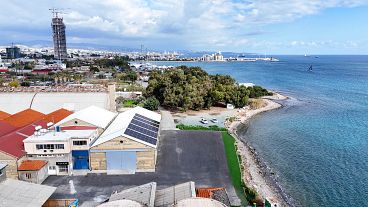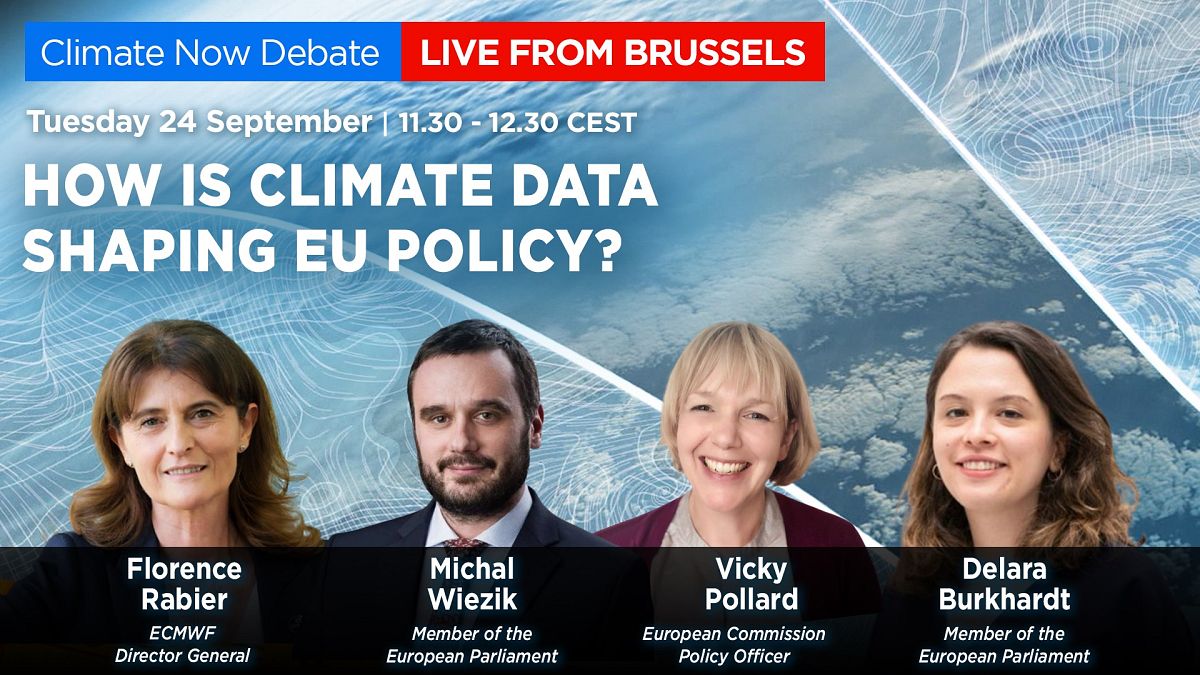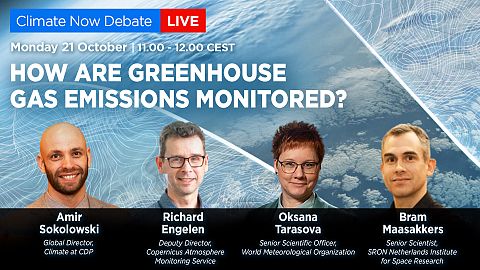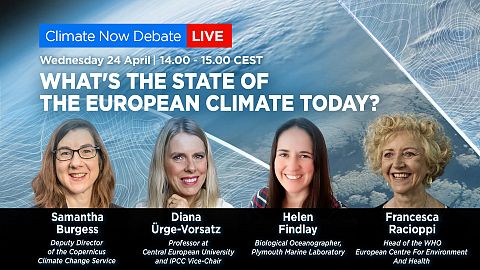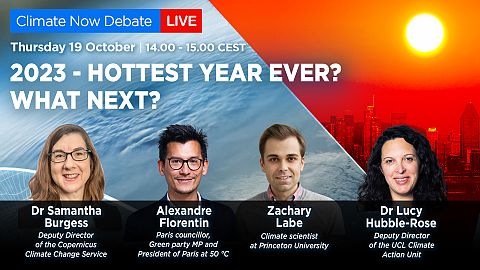At this live Climate Now debate, our experts explored how climate data is shaping EU policy, reflecting on past decisions and future strategies.
At our live Climate Now debate in Brussels, we heard from MEPs and a European Commission policy expert about how climate data from services such as Copernicus and the ECMWF is "fundamental" to policymaking.
Our panellists emphasised that policymakers receive climate information from various sources - both satellite data and scientific reviews but also lobbying - meaning some may be more biased than others.
“You as an MEP can select which lobbyists you meet and you might be able to filter which lobbyists provide you with solid data and which try to navigate you somewhere and may be biased,” explains MEP Michal Wieznik.
The key issue that emerged was the need to continue improving communication methods of climate data in a way that prompts lawmakers to action rather than reaction post-disaster.
Hosted by Euronews science correspondent Jeremy Wilks, the one-hour live event featured MEP Delara Burkhardt, ECMWF Director General Florence Rabier, European Commission policy expert Vicky Pollard and MEP Michal Wiezik.
You can watch highlights from the Climate Now Live debate at the top of this article and a live replay of the full debate here:
Effective climate data communication is crucial to EU lawmakers
Central to the debate was how effective current climate data communication is deemed to be by EU lawmakers.
As panellist MEP Delara Burkhardt noted, there are politicians and policymakers who continue to deny or downplay the climate crisis, meaning improvements to climate messaging and communication are still necessary.
She also underlined that politicians need to be aware data can be bought and biased to influence policymaking.
“We always act like data is something neutral from scientists but you can make your own studies in the interests of a company,” she said. “We need the media to make more noise about this.”
The panel discussed how narrowing the focus of the effects of climate change down to a personal level could make the message more powerful.
This was in response to a question submitted online that pointed out that climate data is also “livelihood data, lives lost data, national security data and international systems data” and wanted to know how politicians would be “upskilled” to take this into account.
“I am very much in favour of that because it is about communication; we need to make sure politicians see the necessity of engaging with this data,” said Burkhardt.
“There is a think tank in Berlin breaking down climate data into individual destinies. It has developed personas that represent average people in German society based on income, energy use and housing to show how climate policies affect their daily lives.”
MEP Michal Wiezik noted that physical actions seem to have more effect on policymaking than numerical data.
“My experience is that the parliament listens best to protests and crises when something is changing and moving,” he said, citing the farmers’ protest and the Fridays for Future movement, which shaped policy.
“We have all the data we need and we don’t listen to it,” he said. “If we were fact-driven, the outcome would be effective but policy is also about interests and different viewpoints.”
Wieznik also highlighted that there’s an economic argument that can cut through.
“This situation is not just about climate and the environment but also about the economy, security and geopolitics,” he said.
“If you tackle climate change you will probably also provide society with cheap and clean energy, ending dependence on imports from countries like Russia, so this is a huge advantage we need to touch on.”
The power of lobbying during EU policymaking
On top of climate data from services such as Copernicus, policymakers also receive pitches from lobbyists.
After EU member states signed the Treaty of Lisbon in 2007, lobbying at the European Union level has increasingly become a part of the political decision-making and legislative process.
"The reason why there are so many lobbyists in Brussels is because the Parliament is making a lot of decisions," said Burkhardt during the debate.
"It is a little bit of proof of the importance of the Parliament in the legislative process of the EU."
Burkhardt highlighted that the increase in lobbying means other voices have been subdued, using packaging waste as an example.
"What I consider to be problematic is that there is a misrepresentation of who has access to influence policymaking," she said. "There is a growing number of industry lobbyists that have a huge influence but representation of consumer perspective is very low."
In 2022, when the European Parliament was voting on legislative proposals to achieve its 2030 climate goals, it received “a tsunami of lobbying”, according to Pascal Canfin, chairman of the Parliament’s environment committee.
MEPs received pushback from sectors including car manufacturers - who held 32 meetings with lawmakers over proposed CO2 regulations for cars - and chemical industries.
In an op-ed published in French newspaper Le Monde, Canfin called out German carmaker BMW and trade association Eurofer for their attempts to “torpedo” the Fit for 55 package.
Concrete climate data is ‘fundamental’ to EU policymaking
So what climate data is currently available to policymakers?
During the debate, policy expert Vicky Pollard explained that the European Commission uses data from the Intergovernmental Panel on Climate Change (IPCC) to direct policymaking.
“The IPCC is fundamental in determining what is happening to the climate and what we need to contribute. We use that as the basis of our modelling work,” she said.
The European Commission also invests in science through research programmes that study the impacts of climate change on different parts of society and natural systems.
Alongside discussions and meetings with scientists, Pollard said operational data like satellite imaging is a key tool for communicating climate information.
“It is a fast way to assimilate information and an early warning system helping us to understand adaptation,” said Pollard.
This includes information about land use change, areas where emissions need to be reduced and areas where carbon capture needs to be increased. “We can see how things are happening on the ground and use this to inform policymaking,” Pollard added.
Audience members were invited to ask questions during the debate and one query centred on how the “masses of information and data can be made clear to policymakers and the public and how the impact of EU legislation can be translated.”
Observation programme Copernicus has multiple tools that help translate the vast amount of climate data available into understandable and actionable information.
"ECMWF and Copernicus provide science-based, unbiased facts with EU investments to deliver information on the past climate and future projections which can be used as a trusted source," said ECMWF director general Florence Rabier.
Open and free interactive tools to navigate IPCC projections include the Climate Atlas - where you can look at your country or region under certain scenarios of greenhouse gas emissions or global warming - and Climate Pulse which gives real-time data like global surface air temperature and sea surface temperature.
Rabier also explained more about a new project called Destination Earth, which will create a digital twin of the planet and its atmosphere, and should allow policymakers to model various “what if” scenarios and see their predicted impact on the planet.
“You can play out some simulations like what if we plant trees, what if we take this action with reservoirs,” she said. “This is a useful tool to say what we could do and what effects it would have.”
EU green policies make climate neutrality key goal for 2050
Climate data has already been key to enshrining environmental policies in legislation. In December 2019, the European Council presented the European Green Deal.
EU leaders agreed that the bloc should achieve climate neutrality by 2050. This means having a net-zero emissions balance - only emitting as much greenhouse gas into the atmosphere as can be absorbed by nature through forests, oceans and soil.
In December 2020, EU leaders pledged to more than halve (compared to 1990 levels) the EU's greenhouse gas emissions by 2030 as an intermediate step towards the 2050 goal.
In order for the EU to reach climate neutrality, leaders have developed the 'Fit for 55' package. This is a set of proposals to revise existing legislation and put in place new initiatives as part of the union’s strategy for turning climate goals into EU law.
The name Fit for 55 refers to the EU’s target of reducing net greenhouse gas emissions by at least 55 per cent by 2030.
Measures include increasing the uptake of greener fuels in transport sectors, toughening CO2 emissions standards for cars and vans, revising energy taxation, boosting renewable energy and making buildings greener.
Meet the panellists:
Vicky Pollard, European Commission Policy Officer
Vicky Pollard is head of the unit in the European Commission’s Directorate General for Climate Action, covering modelling and economic analysis for climate ambition and policy, the greenhouse gas inventory and reporting of climate action as well as climate science.
Pollard has worked on climate change for the Commission since 2006, covering a number of issues including international negotiations, climate cooperation with OECD countries, the implementation of the EU emissions trading system, cooperation on ETS design, international carbon markets and work on just transition. From 2014 to 2019, Pollard was Counsellor for Environment and Climate at the EU's delegation to China in Beijing.
She has a Masters in Environmental Economics and worked in a number of posts in consultancy, the EU wind energy association and the UK government, before joining the European Commission in 2004.
Delara Burkhardt, MEP
Delara Burkhardt is an MEP for Germany’s Social Democratic Party (SPD) and became the country’s youngest MEP when she took up the position in 2019.
The Iranian-German politician is a member of the European Parliament’s committee on the environment, where she deals with climate and biodiversity protection and the circular economy. She is currently working on introducing European rules for deforestation-free supply chains. Burkhardt also acts as spokesperson for the SPD delegation in the European Parliament on environmental policies.
Burkhardt has a Master’s degree in socioeconomics from the University of Hamburg and participated in the Obama Foundation’s emerging leaders programme in 2022.
Florence Rabier, ECMWF Director General
Florence Rabier has been Director-General of ECMWF since January 2016, leading the intergovernmental organisation through a period of major changes and expansion.
She is an internationally recognised expert in Numerical Weather Prediction and contributed to delivering major changes at both ECMWF and Météo-France. She is well known within the meteorological community for her key role in implementing an innovative data assimilation method, which was a first worldwide and contributed to an optimal use of satellite observations in weather forecasting.
Rabier has been awarded the title of “Chevalier de la Légion d’Honneur”, and the Great Prize of the Air and Space Academy for the IASI project (Infrared Atmospheric Sounding Interferometer) and its atmospheric and weather applications. She is also an Honorary Member of the American Meteorological Society and a fellow of the National Academy of Technology of France.
Michal Wiezik, MEP
Michal Wiezik is a Slovak MEP and part of the Renew Europe group. He is a member of the European Parliament’s committee on the environment.
Wieznik is also a member of the European Parliament Intergroup on Climate Change, Biodiversity and Sustainable Development and the European Parliament Intergroup on Seas, Rivers, Islands and Coastal Areas.
Wieznik studied environmental protection at the Technical University in Zvolen where he also completed a PhD and taught as a professor.




